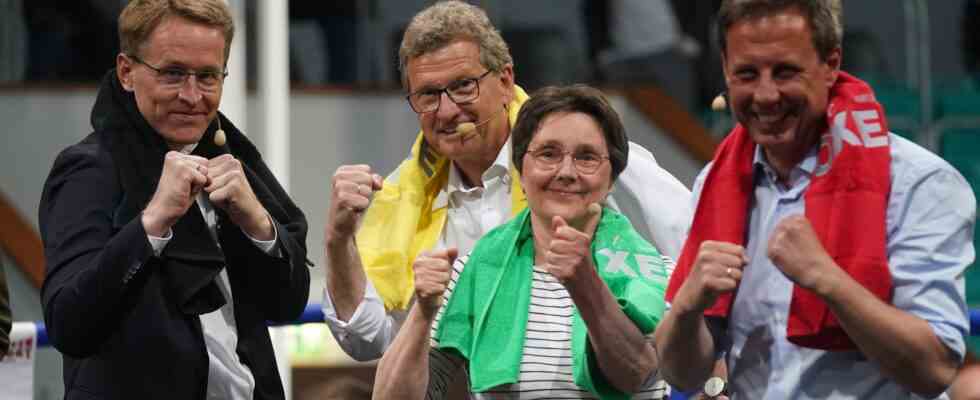overview
Status: 05/05/2022 4:14 p.m
An ex-Greens who is running for the SPD. A green finance minister with an eye for social affairs. An FDP top candidate whose name is not Kubicki: With which personnel are the most important parties going in the Schleswig-Holstein elections?
In addition to the CDU and SPD, the Greens in Schleswig-Holstein also laid claim to government office for the first time in this election campaign – and put up their own candidate. FDP, AfD and SSW want to be as strong as possible in parliament. An overview of Günther’s most important challengers and top candidates.
The ex-Green: Thomas Losse-Müller (SPD)
He wants to go where he has been before: Thomas Losse-Müller is running for the SPD and would like to move into the state chancellery on the Kiel Fjord after the election. But this time as the highest employer, as Prime Minister. Most recently, he worked here as head of the state chancellery – until 2017 under Schleswig-Holstein’s last SPD prime minister, Torsten Albig. At that time, the economist, who had previously worked for Deutsche Bank, the World Bank and Schleswig-Holstein’s Ministry of Finance, was still a member of the Greens. In the meantime he changed parties and worked as a management consultant. He joined the SPD in 2020 because for him it was the party that organizes social cohesion and in which all parts of society are represented, explains the 48-year-old.
With a red party book, Losse-Müller is campaigning for the votes of the voters in the northernmost state and for a state government without the CDU with social issues, digitization and climate protection. He promises free basic day care, the reintroduction of rent control, free tablets for students from the 8th grade and faster expansion of renewable energies. “I’ve been in the machine room for the past 20 years and I know how this country and the companies work,” says Losse-Müller.
Woman of numbers: Monika Heinold (Greens)
When Losse-Müller was still working as State Secretary in the Green-led Ministry of Finance, he had a boss: Monika Heinold. For ten years now, the qualified educator has been the “woman of numbers” in the north – now she is challenging Prime Minister Günther. With Heinold, the North Greens have put up a candidate for the prime minister’s job for the first time. After all, the party was the strongest political force in the country in the 2019 European elections. The 63-year-old is clearly the green number 1 on the ballot paper, but the party has set up a duo. In addition to Heinold, the Vice President of the State Parliament, Aminata Touré, is also a top candidate.
Heinold has been Minister of Finance in Kiel since 2012 – first in a coalition with the SPD and SSW, most recently in the Jamaica alliance with Prime Minister Günther and the FDP. Before that, she was a member of the state parliament for 16 years. She says she went into politics because of the issue of social justice and then realized how crucial fiscal policy was. So she got used to it, despite resistance that was due to her gender and her job, she says. Heinold’s election promise: As Prime Minister, she wants to make climate protection a matter for the bosses and make it socially just.
They are still governing together in a coalition with the CDU: Greens top woman and Finance Minister Monika Heinold and FDP top candidate and Economics Minister Bernd Buchholz
Image: dpa
No Kubicki: Bernd Buchholz (FDP)
For the first time in what feels like an eternity, the FDP is not campaigning for votes with Wolfgang Kubicki as its top candidate. In the six previous state elections, Kubicki was always the driving force and face of the party in the north. In the meantime, however, he has completely moved to Berlin.
But Buchholz is also no stranger to Schleswig-Holstein. The 60-year-old has been Economics and Transport Minister since 2017. He used to be a lawyer, publishing manager and was a member of the state parliament in the 1990s.
Buchholz likes at least two types of appointments: feel-good appointments like groundbreaking, but also difficult missions. He obviously enjoys arguing with trade unionists who don’t have much time for an FDP minister like him. Buchholz promises to continue to work as a minister for the expansion of the infrastructure and to settle new companies. He is convinced that the current state government made up of CDU, Greens and FDP has ensured a better quality of life, and he wants to build on that.
Constant in a divided party: Jörg Nobis (AfD)
For the second time after 2017, Nobis is the AfD top candidate in Schleswig-Holstein. The 46-year-old is a constant within the long-established state association, which still has no chairman. Initially, Nobis was the head of the parliamentary group, after the loss of group status due to the split, he led the parliamentary group of the remaining three AfD representatives.
On posters and in speeches, Nobis promises to work for affordable energy – for example by lowering the energy tax. Nobis is harsh on the state government’s corona and refugee policy.
The talker: Lars Harms (SSW)
Lars Harms is the face of the SSW, the party of the Danish and Frisian minority in the country. It is exempt from the five percent hurdle. The 57-year-old has been a member of the state parliament for 20 years and has headed its parliamentary group since 2012. Harms is not only able to speak on minority issues, he has given almost 450 speeches. Recently, he has increasingly focused on social issues. He calls for a minimum wage of 13 euros and effective measures against rising prices. The party rejects the construction of the LNG terminal in Brunsbüttel.

